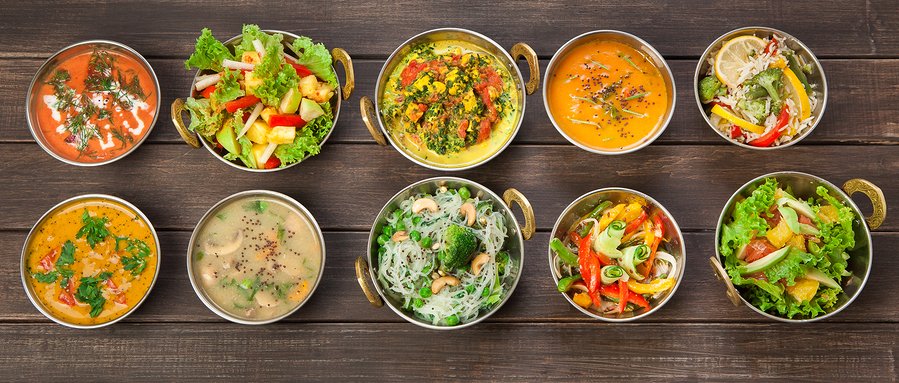Shedding excess pounds can be a struggle, even when you’re adopting more nutritious eating habits and stepping up your exercise routine. You don’t want to try some fad diet that’s probably not healthy and you know that the weight isn’t just going to disappear overnight, but it’s still frustrating to not see much change registering on the scale at all. The answer, however, might lie in cutting out certain elements of your diet—namely, meats. In fact, new research suggests that going vegetarian “might” make a big difference in turning the corner for losing some of that extra weight.
The study, which was conducted at the Institute for Clinical and Experimental Medicine in Prague, Czech Republic, found that sticking to a vegetarian diet may be twice as effective for achieving weight loss as a similar diet recommended for diabetics that allows for the consumption of lean meat and poultry.1 Kahleova, Hana; et al. “The Effect of a Vegetarian vs Conventional Hypocaloric Diabetic Diet on Thigh Adipose Tissue Distribution in Subjects with Type 2 Diabetes: A Randomized Study.” Journal of the American College of Nutrition. 10 June 2017. Accessed 18 June 2017. http://www.tandfonline.com/doi/full/10.1080/07315724.2017.1302367. Those with type 2 diabetes and metabolic syndrome (a cluster of conditions that can include obesity, high blood pressure, insulin resistance, and more) were the focus of this investigation since restoring a normal body weight can help reverse some of their harmful effects, but the results should apply to everyone.
The subjects had all been diagnosed with type 2 diabetes. They were randomly divided into two groups, one of which followed a vegetarian eating plan while the other adhered to dietary standards laid out by the European Association for the Study of Diabetes. The vegetarian diet was centered around consumption of fruits, vegetables, grains, legumes, needs, and seeds, with one serving of low-fat yogurt each day being the sole animal product on the menu. In contrast, the conventional diet included numerous animal-based foods.
Both of the eating plans restricted caloric intake to 500 calories a day less than what the participants would require to maintain their weight at the outset of the research. Given those parameters, you might think that with the same calorie cutting, the results would be the same for both groups. But that was not the case. Six months into the dietary changes, those on the vegetarian plan had lost an average of 6.2 kg (13.67 pounds) of weight versus an average loss of 3.2 kg (7.05 pounds) for their peers on the conventional diet.
In addition to losing nearly twice the amount of weight in six months, the vegetarian eaters received greater benefits in fat reduction as well. Fat measurements were taken as the study began and again at the six month mark. All of the volunteers, regardless of diet group, had comparable loss of subcutaneous fat, which is directly under the surface of the skin. However, the measure of intramuscular fat, the type that accumulates within muscles, was lowered considerably more in those on the vegetarian diet. And subfascial fat, which is located on the surface of muscles, was only reduced in the vegetarian group and not at all among the meat eaters. This is important because helping diminish our fat stores is healthier and it also helps promote a faster metabolism. It’s also important to note that research has shown that abdominal fat is the most dangerous type of fat—and particularly what is known as visceral fat. Visceral fat, which is deep inside the abdomen around the internal organs, poses the most serious health risks. The metabolic products produced by visceral fat cells are released into the portal circulatory system, which carries blood from the abdominal organs to the liver. Visceral fat cells that are enlarged pour free fatty acids into the liver. These acids also accumulate in the pancreas, heart, and other organs that are not designed to store fat, which results in organ dysfunction.
While the size of the study was too small to yield any truly hard evidence, it can still provide some food for thought about ways we can change our eating habits for long-term benefits. If you’ve toyed with the idea of becoming a vegetarian, it might be worth a try as long as you make sure you are still getting your protein from non-animal sources such as nuts, beans, lentils, and quinoa.
Or, if that’s too much of a commitment for you, there’s always the possibility of choosing to follow a vegetarian diet a few days a week, or being vegetarian but eating fish (known as pescetarianism). In fact, a 2015 study at Loma Linda University in California found that vegetarian diet that includes fish is associated with a lower risk of colon cancer than either a carnivorous diet or other vegetarian diets.2 Orlich, Michael J.; et al. “Vegetarian Dietary Patterns and the Risk of Colorectal Cancers.” JAMA Internal Medicine. May 2015. Accessed 19 June 2017. http://jamanetwork.com/journals/jamainternalmedicine/fullarticle/2174939. A plant-based diet offers a range of health benefits that extend beyond weight loss to disease prevention and a higher intake of many nutrients, so consider it as an option even if it’s part time.
Note: A plant-based diet that swaps out lean meat for high-glycemic refined grains and lots of sugar and oils is not what we’re talking about.
References
| ↑1 | Kahleova, Hana; et al. “The Effect of a Vegetarian vs Conventional Hypocaloric Diabetic Diet on Thigh Adipose Tissue Distribution in Subjects with Type 2 Diabetes: A Randomized Study.” Journal of the American College of Nutrition. 10 June 2017. Accessed 18 June 2017. http://www.tandfonline.com/doi/full/10.1080/07315724.2017.1302367. |
|---|---|
| ↑2 | Orlich, Michael J.; et al. “Vegetarian Dietary Patterns and the Risk of Colorectal Cancers.” JAMA Internal Medicine. May 2015. Accessed 19 June 2017. http://jamanetwork.com/journals/jamainternalmedicine/fullarticle/2174939. |











